Yakima
(509) 225-3668
Ellensburg
(509) 925-4633
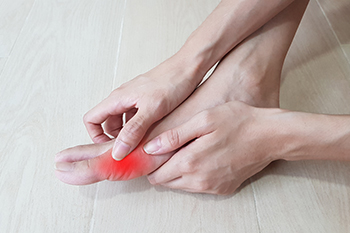
Gout and bunions are common sources of big toe pain, but they arise from very different causes. Gout is an inflammatory arthritis caused by uric acid crystals that accumulate in the joint. This leads to sudden and intense pain, swelling, and tenderness, particularly in the big toe. Gout often strikes unexpectedly and can be worsened by consuming foods and beverages rich in purines. Bunions are bone deformities that develop gradually due to biomechanical issues in the foot. They occur when the big toe pushes against the second toe, causing a bony bump on the side of the foot. A podiatrist can provide relief for bunions by recommending custom orthotics, shoe modifications, and, if necessary, surgery to alleviate pain and correct the deformity. Both gout and bunions can be managed with proper care from a podiatrist for long-term relief. If you are experiencing big toe pain, it is suggested that you schedule an appointment with a podiatrist.
Toe pain can disrupt your daily activities. If you have any concerns, contact one of our podiatrists of Cascade Foot & Ankle. Our doctors can provide the care you need to keep you pain-free and on your feet.
What Causes Toe Pain?
Most severe toe pain is caused due to a sports injury, trauma from dropping something heavy on the toe, or bumping into something rigid. Other problems can develop over time for various reasons.
Toe pain can be caused by one or more ailments. The most common include:
When to See a Podiatrist
Diagnosis
In many cases the cause of toe pain is obvious, but in others, a podiatrist may want to use more advanced methods to determine the problem. These can range from simple visual inspections and sensation tests to X-rays and MRI scans. Prior medical history, family medical history, and any recent physical traumatic events will all be taken into consideration for a proper diagnosis.
Treatment
Treatments for toe pain and injuries vary and may include shoe inserts, padding, taping, medicines, injections, and in some cases, surgery. If you believe that you have broken a toe, please see a podiatrist as soon as possible.
If you have any questions please feel free to contact our offices located in Yakima and Ellensburg, WA . We offer the newest diagnostic tools and technology to treat your foot and ankle needs.
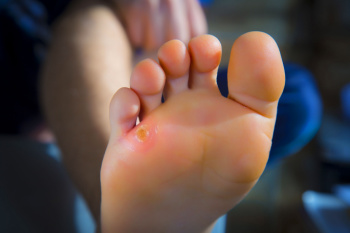
Corns and calluses are both thickened areas of skin that develop due to repeated friction or pressure, but they differ in their location and appearance. Corns typically form on the toes or between the toes, appearing as small, thickened, and often painful areas with a central core. They are usually caused by wearing tight or ill-fitting shoes that create localized pressure on specific points. Symptoms include pain, tenderness, and sometimes redness. Calluses, on the other hand, usually develop on the soles of the feet or other weight-bearing areas. They are larger and less defined than corns. They are also generally less painful. Calluses form as a protective response to repeated friction or pressure, often from walking or standing for long periods. Treatment for both conditions involves reducing pressure and friction. If you have corns or calluses that impede your daily activities, it is suggested you schedule an appointment with a podiatrist to discuss effective relief and management techniques.
Corns can make walking very painful and should be treated immediately. If you have questions regarding your feet and ankles, contact one of our podiatrists of Cascade Foot & Ankle. Our doctors will treat your foot and ankle needs.
Corns: What Are They? And How Do You Get Rid of Them?
Corns are thickened areas on the skin that can become painful. They are caused by excessive pressure and friction on the skin. Corns press into the deeper layers of the skin and are usually round in shape.
Ways to Prevent Corns
There are many ways to get rid of painful corns such as:
Treating Corns
Although most corns slowly disappear when the friction or pressure stops, this isn’t always the case. Consult with your podiatrist to determine the best treatment option for your case of corns.
If you have any questions please feel free to contact our offices located in Yakima and Ellensburg, WA . We offer the newest diagnostic and treatment technologies for all your foot and ankle needs.
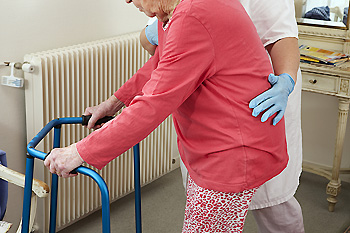
Gait and balance disorders are prevalent among the elderly, often leading to increased fall risk and decreased mobility. Falling can seriously impact the feet, and may cause pain, discomfort and difficulty in completing daily activities. These disorders can arise from various causes, including muscle weakness, joint stiffness, neurological conditions, and medications. Symptoms typically involve unsteady walking, difficulty maintaining balance, and frequent falls. Diagnosing these issues often involves the Timed Up and Go Test, where a person is timed as they rise from a chair, walk a short distance, and return to the chair. This test helps evaluate the individual's mobility, balance, and risk of falling. If you or someone you know has fallen without an obvious cause, it is suggested that you schedule an appointment with a podiatrist who can treat various foot conditions and determine the cause of falling.
Preventing falls among the elderly is very important. If you are older and have fallen or fear that you are prone to falling, consult with one of our podiatrists from Cascade Foot & Ankle. Our doctors will assess your condition and provide you with quality advice and care.
Every 11 seconds, an elderly American is being treated in an emergency room for a fall related injury. Falls are the leading cause of head and hip injuries for those 65 and older. Due to decreases in strength, balance, senses, and lack of awareness, elderly persons are very susceptible to falling. Thankfully, there are a number of things older persons can do to prevent falls.
How to Prevent Falls
Some effective methods that older persons can do to prevent falls include:
Falling can be a traumatic and embarrassing experience for elderly persons; this can make them less willing to leave the house, and less willing to talk to someone about their fears of falling. Doing such things, however, will increase the likelihood of tripping or losing one’s balance. Knowing the causes of falling and how to prevent them is the best way to mitigate the risk of serious injury.
If you have any questions, please feel free to contact our offices located in Yakima and Ellensburg, WA . We offer the newest diagnostic and treatment technologies for all your foot care needs.
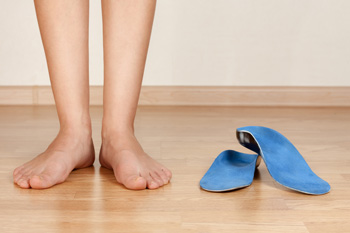
Orthotics are specialized inserts designed to improve foot function and alignment. While experts debate exactly how they work, key theories suggest they correct muscle activity and place the foot in a better position to distribute weight more evenly, reducing strain on muscles and joints. Orthotics are used to treat a range of conditions, from flat feet and plantar fasciitis to chronic pain in the ankles, knees, and lower back. The growing industry offers custom made orthotics, tailored to individual needs based on factors like gait, foot structure, and body weight. Custom options consider these factors to provide precise support and relief. As understanding of biomechanics improves, orthotics continue to evolve, becoming more effective in alleviating foot-related issues and enhancing overall comfort and mobility. If you are interested in learning if orthotics can help you relieve foot and body pain, it is suggested that you consult a podiatrist for further discussion.
If you are having discomfort in your feet and would like to try orthotics, contact one of our podiatrists from Cascade Foot & Ankle. Our doctors can provide the care you need to keep you pain-free and on your feet.
What Are Orthotics?
Orthotics are inserts you can place into your shoes to help with a variety of foot problems such as flat feet or foot pain. Orthotics provide relief and comfort for minor foot and heel pain but can’t correct serious biomechanical problems in your feet.
Over-the-Counter Inserts
Orthotics come in a wide variety of over-the-counter inserts that are used to treat foot pain, heel pain, and minor problems. For example, arch supports can be inserted into your shoes to help correct overarched or flat feet, while gel insoles are often used because they provide comfort and relief from foot and heel pain by alleviating pressure.
Prescription Orthotics
If over-the-counter inserts don’t work for you or if you have a more severe foot concern, it is possible to have your podiatrist prescribe custom orthotics. These high-quality inserts are designed to treat problems such as abnormal motion, plantar fasciitis, and severe forms of heel pain. They can even be used to help patients suffering from diabetes by treating foot ulcers and painful calluses and are usually molded to your feet individually, which allows them to provide full support and comfort.
If you are experiencing minor to severe foot or heel pain, it’s recommended to speak with your podiatrist about the possibilities of using orthotics. A podiatrist can determine which type of orthotic is right for you and allow you to take the first steps towards being pain-free.
If you have any questions please contact our offices located in Yakima and Ellensburg, WA . We offer the newest diagnostic and treatment technologies for all your foot and ankle needs.
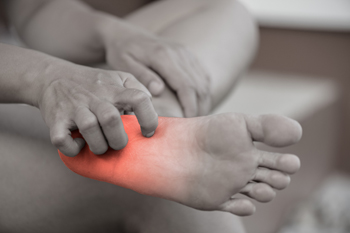
Fabry disease is a rare genetic disorder caused by the buildup of a fat-like substance called globotriaosylceramide due to a deficiency of the enzyme alpha-galactosidase A. This buildup affects various parts of the body, including the heart, kidneys, nervous system, and skin. In terms of foot involvement, Fabry disease can cause burning pain, tingling, and numbness, primarily due to nerve damage, or neuropathy in the feet. This discomfort often becomes worse by physical activity or heat. Diagnosis involves blood tests to measure enzyme levels, genetic testing to confirm mutations, and tissue biopsies to detect GL-3 accumulation. Early diagnosis is imperative as symptoms can progress. If you have foot discomfort or neuropathy, it is strongly suggested that you schedule an appointment with a podiatrist for a proper diagnosis and treatment to help relieve symptoms.
When dealing with systemic disease of the feet, it is extremely important to check the affected areas routinely so that any additional problems are caught quickly. If you have any concerns about your feet and ankles contact one of our podiatrists from Cascade Foot & Ankle. Our doctors will assist you with all of your podiatric needs.
Systemic Diseases of the Feet
Systemic diseases affect the whole body, and symptoms usually are displayed in the feet. This condition can make a patient’s ability to walk unbearable. Systemic diseases include gout, diabetes mellitus, neurological disorders, and arthritis.
Gout – is caused by an excess of uric acid in the body. Common symptoms include pain, inflammation, and redness at the metatarsal/phalangeal joint of the base big toe. Gout can be treated by NSAIDs to relieve pain and inflammation, and other drugs that lower the acid levels in the body.
Diabetes mellitus – is an increase in the level of blood sugar that the body cannot counteract with its own insulin. Failure to produce enough insulin is a factor in Diabetes.
Diabetes of the Feet
Diabetic Neuropathy – may lead to damaged nerves and affect the feet through numbness and loss of sensation.
Peripheral Vascular Disease – can restrict the blood flow to the feet, and often times lead to amputation of the feet.
If you have any questions please feel free to contact our offices located in Yakima and Ellensburg, WA . We offer the newest diagnostic and treatment technologies for all your foot and ankle needs.